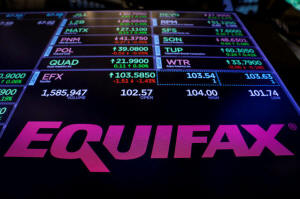Bankers anxious over consumer reactions to Equifax
breach
 Send a link to a friend
Send a link to a friend
 [September 30, 2017]
By David Henry and Ross Kerber [September 30, 2017]
By David Henry and Ross Kerber
(Reuters) - U.S. lenders are concerned
their consumer loan and credit card businesses could be stymied if large
numbers of people lock or freeze their credit reports to protect
themselves in the wake of the Equifax Inc <EFX.N> hack.
Equifax said on Wednesday it "will let consumers easily lock and unlock
access to their Equifax credit files" by the end of January.
The pledge came in an apology from the company's interim chief executive
for the exposure of personal identification information for 143 million
people in a cyber attack.
Financial advisers recommend many people freeze their records to block
thieves trying to borrow in their name.
Restrictions on reports, however, stall the credit checks lenders need
for making legitimate loans, requiring borrowers take the extra step of
getting the restrictions removed.
"Banks hate credit freezes. The banks want people to buy things on
credit without a second thought," said Chris Hoofnagle, a law professor
at the University of California, Berkley, and an author on consumer
protection law.

The time required to remove restrictions could thwart issuance of new
credit cards, especially store credit cards that offer instant discounts
on purchases. Second thoughts could lead drivers to spend less on cars
when they reconsider how much they will have to borrow for more
expensive models.
Only 2 to 3 percent of U.S. consumers currently have freezes on their
credit reports, said Avivah Litan, a security analyst at research firm
Gartner Inc.
[to top of second column] |

The logo and trading information for Credit reporting company
Equifax Inc. are displayed on a screen on the floor of the New York
Stock Exchange (NYSE) in New York, U.S., September 26, 2017.
REUTERS/Lucas Jackson

But with the publicity around the breach, the number will rise. "People are
thinking about it like never before," Litan said, adding that the number will
double, though only to 5 percent, without any noticeable impact on lending.
Still, one banker, who was not authorized to speak on the record, said the
industry does not know how much credit report restrictions will ultimately slow
business. "That's on the worry list."
Litan said more people would already have freezes, which vary from state to
state, if not for credit bureaus having made them "unnecessarily complicated."
She said it is not clear exactly how the Equifax locks will work and how they
differ from freezes. Bankers expect the locks will be easier to remove,
resulting in less "friction" to lending than freezes, which are covered by state
laws.
How many consumers add either restriction could depend on how many frauds
surface, which will take time to emerge.
"Letís face it, 143 million frauds won't be perpetrated right away, it will take
some time to filter through," said Steve Bowman, GM Financialís chief credit and
risk officer.
(Reporting by David Henry in New York and Ross Kerber in Boston; Additional
reporting by John McCrank; Editing by Dan Grebler)
[© 2017 Thomson Reuters. All rights
reserved.] Copyright 2017 Reuters. All rights reserved. This material may not be published,
broadcast, rewritten or redistributed.
 |